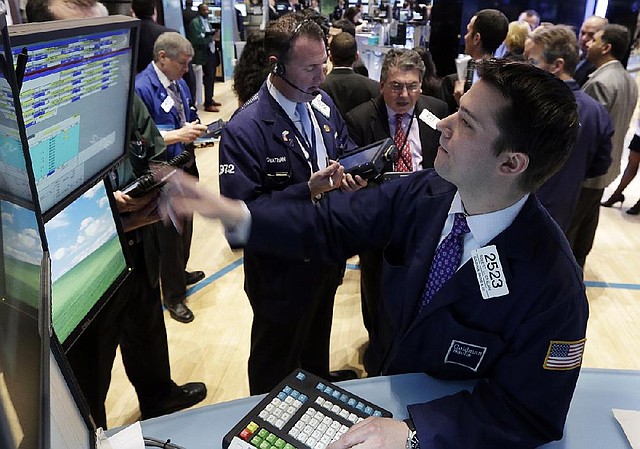Italy politics take toll on stocks
Specialist Robert Canzani (right) works at his post Monday on the floor of the New York Stock Exchange.
Tuesday, February 26, 2013
NEW YORK — Stocks saw their worst drop in more than three months Monday as the prospect of political paralysis in Italy worried traders that Europe’s debt crisis might flare up again.
The Dow Jones industrial average fell 216.40 points, or 1.6 percent, to 13,784.17, its biggest drop since Nov. 7.
The Standard & Poor’s 500 index fell 27.75 points, or 1.8 percent, to 1,487.85, dropping below 1,500 for the first time in three weeks. The Nasdaq composite dropped 45.57 points, or 1.4 percent, to 3,116.25.
Stocks were up earlier in the day as exit polls showed a center-left coalition in Italy that favored economic policy changes in the euro region’s third-largest economy was leading. That gain evaporated after a later poll predicted that the elections could result in a stalemate in the country’s legislature. The losses accelerated in the late afternoon as partial official results showed an upstart protest campaign led by a comedian making stunning inroads.
“There was confidence in this election and obviously confidence imploded,” said Ben Schwartz, a market strategist at Lightspeed Financial.
Investors dumped Italian government bonds, sending their yields higher, and erased most of an early rally in Italy’s stock market. The yield on Italy’s 10-year government bond shot up to 4.43 percent from 4.12 percent early in the day, a sign that investors’ confidence in Italy’s government was dimming. The country’s benchmark stock index, the FSTEMIB, rose 0.7 percent, giving up an early gain of 4 percent.
Investors worry about the outcome of Italy’s election because it could set off another crisis of confidence in the region’s shared currency, the euro. Financial markets in both Europe and the U.S. have swooned at the prospect of Italy or Spain being dragged into the region’s government debt troubles, which have led to bailouts of Greece, Ireland and Portugal and disruptions in financial markets.
As stocks fell, gauges of market sentiment indicated that investors were becoming more risk-averse and parking their money in defensive assets. The yield on the 10-year Treasury note, which is widely considered an ultra-safe investment, fell sharply as investors put their money into U.S. government bonds. The yield fell to 1.88 percent from 1.96 percent late Friday.
The Standard & Poor’s 500 had its first weekly decline of the year last week. Investors sent stocks plunging after minutes from the Federal Reserve’s latest policy meeting revealed disagreement over how long to keep buying bonds in an effort to help the economy.
Fed chairman Ben Bernanke will testify before the U.S. Senate’s banking committee today and again before Congress on Wednesday. Investors will watch to see if he gives any further indications about how long the central bank intends to keep providing stimulus to the economy.
Four stocks fell for every one that rose on the New York Stock Exchange. Consolidated volume was average, 3.8 billion shares.
Business, Pages 24 on 02/26/2013
